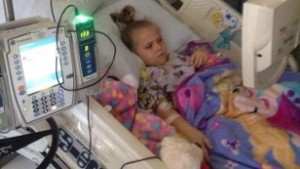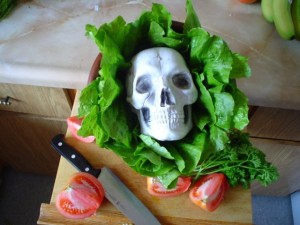The U.S. Centers for Disease Control and Prevention reports 24 people infected with a closely related Listeria strain have been reported from nine states since August 8, 2010.
 Twenty-one people were hospitalized. Five illnesses were pregnancy-related; one resulted in a fetal loss. One death was reported from Ohio.
Twenty-one people were hospitalized. Five illnesses were pregnancy-related; one resulted in a fetal loss. One death was reported from Ohio.
Additional illnesses are under investigation.
The investigation has not conclusively identified the source of this outbreak, but most ill people interviewed reported eating soft cheese before becoming ill. This investigation is ongoing.
Eighteen (82%) of the 22 ill people with available information reported eating soft cheeses in the month before becoming ill.
Four (57%) of seven ill people who specified a brand of cheese reported brands distributed by Karoun Dairies. No other brand of cheese was reported more than once.
On September 16, 2015, Karoun Dairies, Inc. voluntarily recalled[PDF – 2 pages] and ceased production of certain cheeses that the company distributes due to possible contamination with Listeria.
Products were sold under the following brands: Karoun, Arz, Gopi, Queso Del Valle, Central Valley Creamery, and Yanni.
 Products are vacuum packed, in jars or in pails. Weights vary from 5 ounces to 30 pounds.
Products are vacuum packed, in jars or in pails. Weights vary from 5 ounces to 30 pounds.
A full list of cheeses is available on the Advice to Consumers, Restaurants, and Retailers page.
Consumers should not eat, restaurants should not serve, and retailers should not sell recalled cheeses. These products may be contaminated with Listeria and may make people sick.
Updates will be provided when more information is available.
Initial Announcement
CDC is collaborating with public health officials in several states and the U.S. Food and Drug Administration (FDA) to investigate a multistate outbreak of Listeria monocytogenes infections (listeriosis). Listeria can cause a serious, life-threatening illness.
Public health investigators are using the PulseNet system to identify illnesses that may be part of this outbreak. PulseNet is the national subtyping network of public health and food regulatory agency laboratories coordinated by CDC. DNA “fingerprinting” is performed on Listeria bacteria isolated from ill people by using techniques called pulsed-field gel electrophoresis (PFGE) and whole genome sequencing (WGS). PulseNet manages a national database of these DNA fingerprints to identify possible outbreaks. WGS gives a more detailed DNA fingerprint than PFGE. In the current outbreak, this additional detail was important. Five rare PFGE fingerprints of Listeria are included in this investigation. The sequencing showed that the Listeria strains with the five rare PFGE fingerprints are closely related genetically.
Twenty-four people infected with one of the closely related Listeria strains have been reported from nine states since August 8, 2010. The number of ill people reported from each state is as follows: California (14), Colorado (1), Illinois (1), Massachusetts (2), Michigan (1), New York (2), Ohio (1), Tennessee (1), and Washington (1).
Dates of Listeria specimen collection range from August 8, 2010 to August 24, 2015. The cluster was first identified in August 2015 after investigators saw an increase in one of the five rare PFGE fingerprints reported to PulseNet. WGS found that the four other PFGE fingerprints were closely related genetically to the first PFGE fingerprint. Illnesses associated with those PFGE fingerprints were added to the investigation, including illnesses that occurred over 5 years ago. Additional illnesses are under investigation.
Ill people range in age from less than 1 year to 92, and the median age is 77. Seventy-five percent of ill people are female. Twenty-one (91%) of 23 ill people for whom information is available reported being hospitalized. Five of the illnesses were pregnancy-related, and one illness resulted in a fetal loss. One death was reported from Ohio.
The investigation has not conclusively identified the source of this outbreak, but most ill people interviewed reported eating soft cheese before becoming ill. The investigation is ongoing.
State and local health departments are interviewing ill people about the foods they may have eaten or other exposures in the month before their illness began. Fifteen (63%) of 24 people with available information are of Middle Eastern or Eastern European descent or shopped at Middle Eastern-style markets. Of 22 ill people for whom information is available, 18 (82%) consumed soft cheeses, and 16 (89%) reported eating Middle Eastern, Eastern European, Mediterranean, or Mexican-style cheeses, including ani, feta (including Bulgarian feta), Middle Eastern-style string cheese, and nabulsi. Four (57%) of seven ill people who specified the brand of cheese eaten reported brands distributed by Karoun Dairies. No other brand of cheese was reported more than once.
On September 16, 2015, Karoun Dairies, Inc. voluntarily recalled and ceased production of certain cheeses that the company distributes due to possible contamination with Listeria. The recall includes several brands and types of cheeses that were distributed to retail outlets in the United States. Products were sold under the following brands: Karoun, Arz, Gopi, Queso Del Valle, Central Valley Creamery, and Yanni. Products are vacuum packed, in jars or in pails. Weights vary from 5 ounces to 30 pounds. A full list of cheeses is available on the Advice to Consumers, Restaurants, and Retailers page.
CDC and state and local public health partners are continuing laboratory surveillance through PulseNet to identify additional ill people and to interview them. Updates will be provided when more information is available.
 County Health Department officials didn’t immediately release the woman’s name or age Friday but said the woman is one of 16 local cases linked to Salmonella poona cases caused by cucumbers grown in Mexico and sold by California-based companies.
County Health Department officials didn’t immediately release the woman’s name or age Friday but said the woman is one of 16 local cases linked to Salmonella poona cases caused by cucumbers grown in Mexico and sold by California-based companies.











